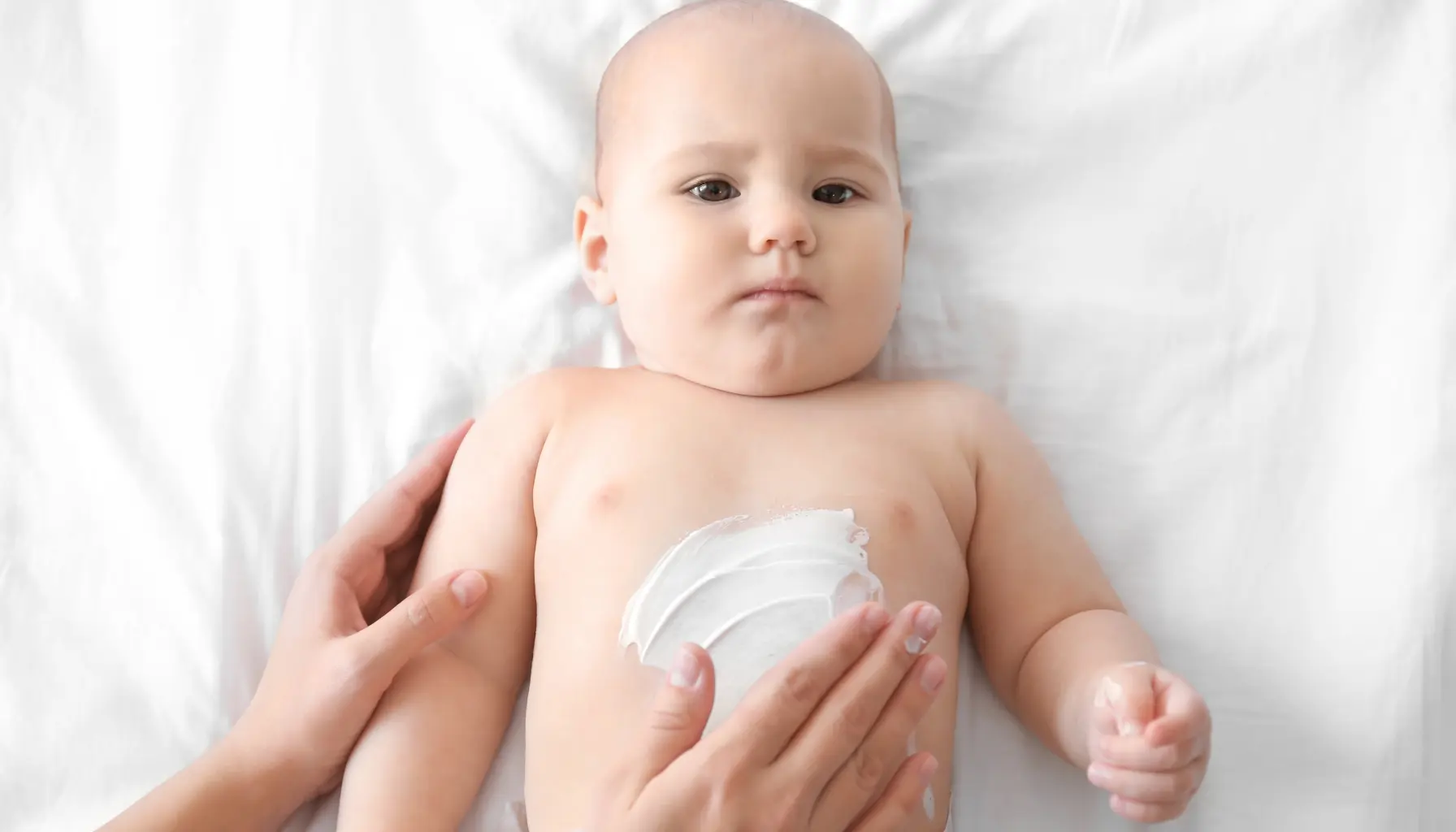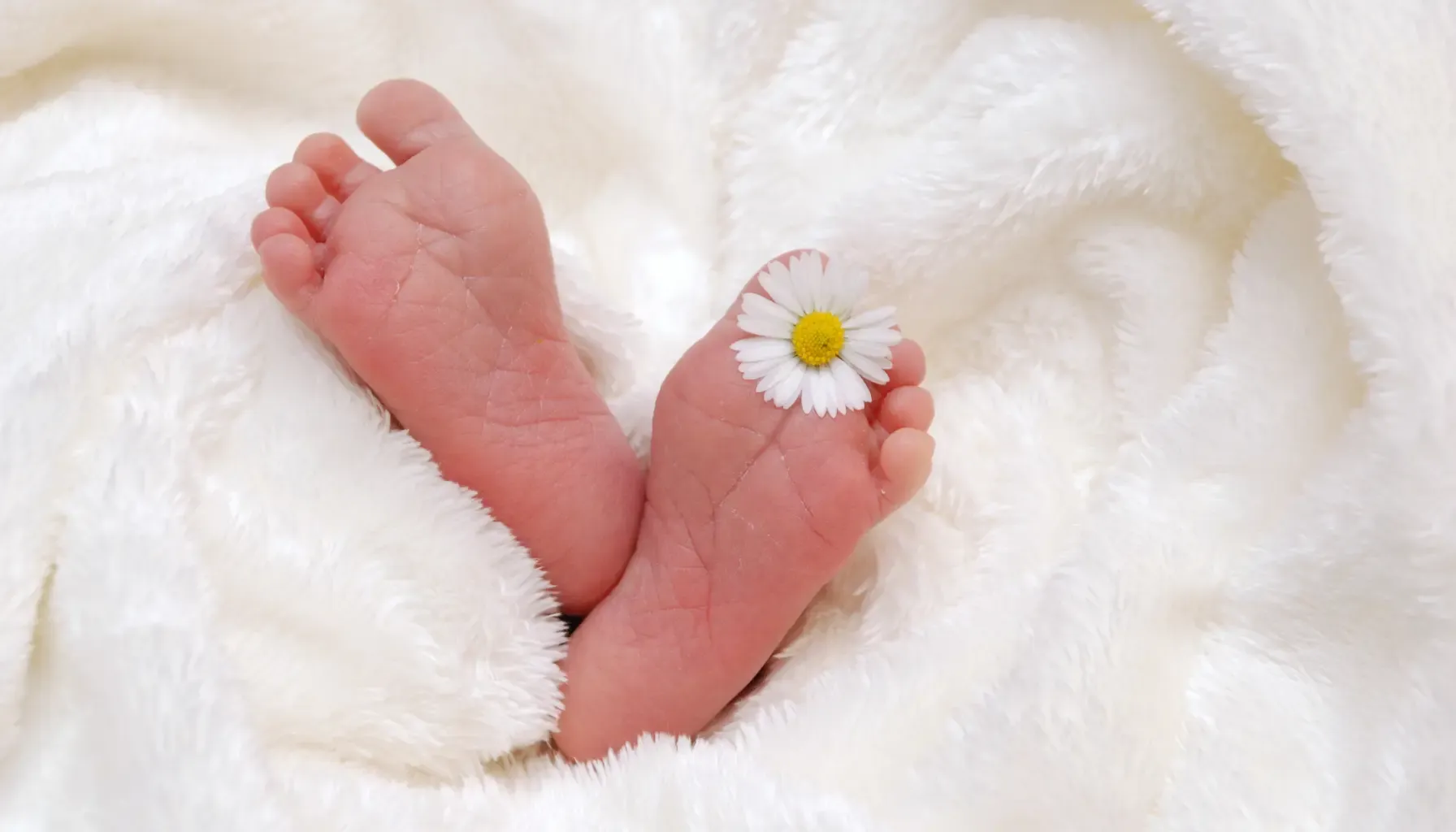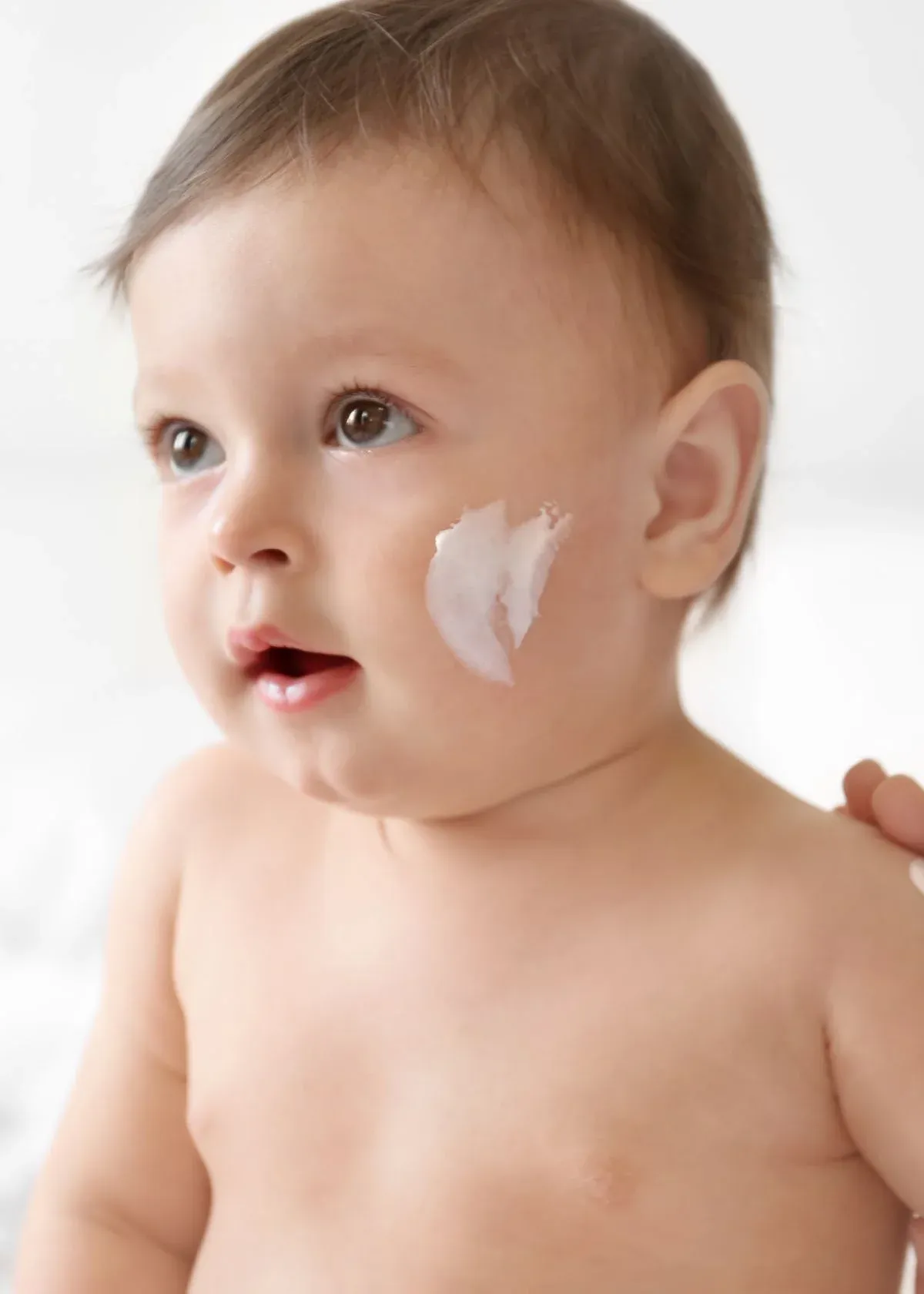Caring for your baby's skin is a delicate matter. As a new parent, you may find yourself asking, "Can I put baby lotion on my baby's face?" It's a valid question, given the sensitivity of a newborn's skin. In this comprehensive guide, we'll explore the nuances of using baby lotion on the face, ensuring your little one's skin remains healthy and happy.
Key Takeaways:
- Understand the importance of choosing the right baby lotion for your baby's delicate skin.
- Learn how to apply baby lotion to your baby's face safely and effectively.
- Discover the best practices for maintaining your baby's skin health.
Choosing the Right Baby Lotion for Delicate Baby Skin

When it comes to your baby's delicate skin, not all baby lotions are created equal. The best baby lotion for your little one's face should be specifically formulated with natural ingredients that cater to sensitive skin types.
Look for products that are hypoallergenic and free from harsh chemicals, artificial fragrances, and harmful chemicals. Natural baby lotion options often contain soothing ingredients like aloe vera, sunflower seed oil, and jojoba oil, which help maintain the skin's natural oils and protective barrier.
It's also crucial to consider any skin conditions your baby may have, such as baby eczema or baby acne. These conditions require gentle lotion choices that won't exacerbate the issues. Fragrance-free lotions and those with a hypoallergenic formula are typically the safest bets. Before applying the product to your baby's face, it's recommended to first do a patch test on a less sensitive part of your baby's body.
Understanding Newborn Skin Care Essentials
When considering, "Can I put baby lotion on my baby's face?", it's important to grasp the fundamentals of newborn skin care. A newborn's skin is extremely sensitive and needs special care to stay healthy. Unlike adult skin, a baby's skin barrier function is not fully developed, which makes it more prone to irritation and dryness.
To keep your baby's skin healthy, it's important to use products specifically designed for their sensitive skin. Fragrance-free lotions are often recommended by pediatricians as they are less likely to cause allergic reactions that can distress your little one's skin.
Introducing lotion to your baby's skin care routine should be done with caution. Newborn skin care is not just about preventing dryness but also about avoiding products that could harm the delicate newborn skin.
It's advisable to avoid lotions that contain harsh chemicals or fragrances that can irritate a baby's sensitive skin. Instead, opt for products that are designed to nourish and protect. Sunflower oil, for example, is a natural ingredient that is gentle on a baby's skin and can help to reinforce the skin's natural barrier, making it a suitable option for many parents.
Recognizing Signs of Baby's Skin Dryness
When pondering the question, "Can I put baby lotion on my baby's face?", it's crucial to recognize the signs of dryness on your little one's skin. Dry skin in babies can appear flaky, rough, or even slightly red.
It's particularly common in newborns as they adjust from the watery environment of the womb to the airier world outside. If you notice your baby's skin dry or peeling, especially on their face, it may be an indication that their delicate skin needs a bit more moisture.
To prevent dryness and maintain your baby's skin healthy, it's important to keep their skin hydrated. A gentle, fragrance-free lotion can be a good ally in this mission. However, before applying any product, test a small amount on a less sensitive area of your baby's body to ensure there is no adverse reaction.
If your baby's skin absorbs the lotion without any signs of irritation, you can consider using it more broadly, always with a light touch and avoiding the area around the eyes.
The Importance of Fragrance-Free Lotions for Baby's Sensitive Skin
Choosing the right products for your baby's sensitive skin is paramount. Fragrance-free lotions are often recommended by pediatricians because they are less likely to irritate a baby's delicate skin. Fragrances, while pleasant-smelling, can cause unwanted reactions and contribute to skin discomfort or allergies.
When selecting a lotion for your newborn's skin, look for ones that are specifically designed to be hypoallergenic and free of dyes and scents.
In addition to being fragrance-free, the ideal lotion for your baby's face should be lightweight and non-greasy. Thick creams and ointments, like petroleum jelly, can be too heavy for the face and may clog pores, leading to other skin issues. Instead, opt for a lotion that is easily absorbed and leaves your baby's skin feeling soft and supple.
Remember, a little goes a long way, so use sparingly to prevent dryness without overloading their skin with product.
The Necessity of Hypoallergenic Lotions for Baby's Sensitive Skin
When considering whether you can put baby lotion on your baby's face, it's crucial to look for hypoallergenic options. These lotions are specifically formulated to minimize the risk of allergic reactions, which is essential for maintaining your baby's delicate skin.
Hypoallergenic lotions are free from common allergens and irritants that could cause discomfort or rashes on your little one's skin. By choosing these products, you're taking a proactive step in preserving the natural softness and health of your newborn's skin, ensuring that their face remains as smooth and supple as the rest of their body.
Moreover, the use of hypoallergenic lotions goes beyond just preventing allergic reactions. These products often contain gentle ingredients that provide the necessary hydration without overwhelming your baby's sensitive skin. They are typically free from harsh chemicals and synthetic fragrances, making them a safer choice for daily use.
When applying lotion to areas like the face, which are more exposed and sensitive, opting for a hypoallergenic lotion can help keep your baby's skin healthy and free from irritation, allowing you to care for your baby's dry skin with peace of mind.
The Role of Pediatrician-Recommended Lotions in Baby's Skin Care
When considering whether you can put baby lotion on your baby's face, seeking advice from a pediatrician can be invaluable. Pediatricians often recommend specific lotions that are formulated to protect and nourish your baby's delicate skin without causing irritation.
These lotions are typically gentle, hypoallergenic, and free from harsh chemicals, ensuring they are safe for use on the sensitive areas of your little one's skin, including their face. By following a pediatrician's guidance, you can maintain your baby's skin health effectively.
Moreover, pediatrician-recommended lotions often contain ingredients that are beneficial for newborn's skin, such as natural oils and emollients that provide hydration without clogging pores. These lotions are designed to address common skin concerns, such as baby's dry skin, while also being suitable for daily use.
It's important to apply these lotions correctly, using a small amount and gently massaging it into the skin to avoid any potential discomfort for your baby.
Applying Baby Lotion to Your Baby's Face Safely

Once you've selected the right lotion, the next step is to apply it correctly. Gently pat your baby's face with a soft towel after a bath, ensuring the skin is damp but not wet. This helps the skin absorb the lotion more effectively. Using gentle strokes, apply a thin layer of the lotion to your baby's face. Be careful to avoid the eye area and any open wounds or areas of irritated skin.
Applying lotion twice a day can help keep your baby's skin moisturized, especially during dry air seasons or if your baby's skin tends to be dry. However, it's important not to overdo it, as too much lotion can clog pores and lead to skin irritation. If you're unsure about how often to apply lotion, consult with your pediatrician for personalized advice.
Integrating Baby Lotion into Your Baby's Daily Routine
Incorporating baby lotion into your baby's daily routine can help keep their skin moisturized and healthy. After bathing your baby, which can strip natural oils from their skin, applying a fragrance-free lotion can help to replenish moisture and prevent baby's skin dryness. It's also a soothing ritual that can strengthen the bond between you and your baby.
When applying lotion, be mindful of areas like the baby's body, face, and even baby's hair if it seems dry, but avoid the area around the umbilical cord until it has fully healed.
Consistency is key to maintaining your baby's skin health. By making lotion application a part of your daily routine, you can help protect your baby's sensitive skin from environmental factors and keep their skin barrier strong.
Remember to use gentle, circular motions and to be particularly gentle when applying lotion to your baby's face. This not only ensures that the lotion is absorbed effectively but also turns the process into a comforting experience for your little one.
The Impact of Environmental Factors on Newborn's Skin
Environmental factors play a significant role in the health of your baby's skin. From the dry air of heated homes in winter to the harsh rays of the sun in summer, your baby's delicate skin is constantly exposed to elements that can lead to dryness and peeling skin.
It's important to understand that while baby lotion can be beneficial, it's also necessary to protect your little one's skin from these environmental stressors. For instance, during colder months, using a humidifier can help maintain moisture in the air, complementing the hydrating effects of baby lotion on your baby's face and body.
In addition to indoor air quality, consider the impact of bath time on your newborn's skin. Water, especially if it's too hot, can strip away natural oils, leaving your baby's skin dry and vulnerable. To counteract this, limit bath time and use lukewarm water. After gently patting your baby's skin dry, apply a fragrance-free lotion to lock in moisture.
This routine helps to create a barrier against environmental factors, ensuring that your baby's skin remains hydrated and protected. Remember, while lotions are helpful, they are just one part of a broader approach to safeguarding your baby's skin against the elements.
The Role of Natural Oils in Baby Skin Hydration

Natural oils can play a significant role in keeping your baby's skin soft and hydrated. When dealing with a baby's dry skin, parents might consider using olive oil, which has been used for centuries to moisturize and protect the skin. However, it's important to note that while olive oil is natural, it's not always the best option for a baby's face.
Some studies suggest that olive oil may weaken the skin barrier, potentially leading to more dryness or irritation. Therefore, it's essential to research and consult with a healthcare provider before introducing any new product to your baby's delicate skin.
In contrast, sunflower oil is often praised for its hydrating properties and is generally considered safe for a baby's skin. It's rich in vitamins that can help to nourish and soothe a baby's sensitive skin.
When selecting a lotion or oil for your baby, look for products that are labeled as "fragrance-free" and "formulated for sensitive skin" to minimize the risk of allergic reactions. Remember, the best lotion for your baby is one that supports their skin's natural health without introducing harsh chemicals. Always patch-test a small amount of any new product to ensure your baby's skin reacts well before applying it more broadly.
Maintaining Your Baby's Skin Health
Keeping your baby's skin healthy involves more than just applying lotion. It's essential to use baby products that are gentle and free from harmful chemicals across the board. This includes baby soap, baby shampoo, and even diaper cream. When giving your baby sponge baths, use warm water and avoid bubble baths, which can strip the skin of its natural oils and lead to dryness.
In addition to using the right products, it's important to protect your baby's skin from environmental factors. Dress your baby in soft, breathable fabrics, and keep their skin covered when exposed to harsh weather conditions. Always ensure that your baby's skin is clean and dry, particularly in the diaper area, to prevent diaper rash and other skin issues.
Summary
In conclusion, you can put baby lotion on your baby's face, but it's essential to choose the right product and apply it correctly. Opt for lotions that are free from fragrances, dyes, and harsh chemicals, and specifically formulated for babies' sensitive skin. Apply the lotion with gentle strokes on damp skin, and be mindful of your baby's overall skin care routine. By following these guidelines, you can help keep your baby's skin soft, supple, and free from irritation.
Frequently Asked Questions
How often should I apply baby lotion to my baby's face?
You can apply baby lotion to your baby's face once or twice a day, especially after baths when the skin is still damp. However, the frequency may vary depending on your baby's skin type and the climate. Always consult with a pediatrician if you're unsure.
Can I use regular adult lotion on my baby's face?
It's not recommended to use adult lotion on your baby's face because adult skin products may contain ingredients that are too harsh for a baby's sensitive skin. Stick to lotions that are specifically formulated for babies.
What should I do if my baby has a reaction to a baby lotion?
If your baby shows signs of an allergic reaction, such as redness, itching, or swelling, stop using the lotion immediately and wash the area with warm water. Contact your pediatrician for further advice and to discuss alternative products that may be more suitable for your baby's skin.
References
- Brown, C., et al. (Year). Tolerance and safety of baby skincare products on infant skin. Journal of Dermatology, Volume(Issue), Page range. DOI or URL
- Lee, X., & Garcia, Y. (Year). Clinical assessment of baby skincare regimens on infant skin conditions. Pediatric Dermatology, Volume(Issue), Page range. DOI or URL
Learn More About Baby Lotions






